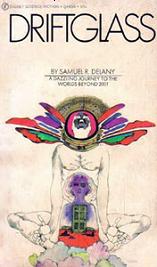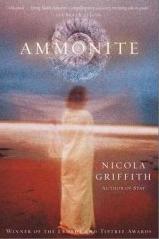Via James Nicoll, the list of winners of the John W. Campbell Memorial Award for Best Science Fiction Novel (but not the John W. Campbell Award for Best New Writer). In bold are those I’ve read, while the ones I read but thought filled a much needed gap in literature are struck through:
- 1973 – Beyond Apollo, Barry N. Malzberg
- 1974 (tie) – Rendezvous with Rama, Arthur C. Clarke; Malevil, Robert Merle
- 1975 – Flow My Tears, The Policeman Said, Philip K. Dick
- 1976 – The Year of the Quiet Sun, Wilson Tucker (special retroactive award for a novel from 1970)
- 1977 – The Alteration, Kingsley Amis
- 1978 – Gateway, Frederik Pohl
- 1979 – Gloriana, Michael Moorcock
- 1980 – On Wings of Song, Thomas M. Disch
- 1981 – Timescape, Gregory Benford
- 1982 – Riddley Walker, Russell Hoban
- 1983 – Helliconia Spring, Brian W. Aldiss
- 1984 – The Citadel of the Autarch, Gene Wolfe
- 1985 – The Years of the City, Frederik Pohl
- 1986 –
The Postman, David Brin - 1987 – A Door into Ocean, Joan Slonczewski
- 1988 – Lincoln’s Dreams, Connie Willis
- 1989 – Islands in the Net, Bruce Sterling
- 1990 – The Child Garden, Geoff Ryman
- 1991 – Pacific Edge, Kim Stanley Robinson
- 1992 – Buddy Holly Is Alive and Well on Ganymede, Bradley Denton
- 1993 – Brother to Dragons, Charles Sheffield
- 1994 – No award
- 1995 – Permutation City, Greg Egan
- 1996 – The Time Ships, Stephen Baxter
- 1997 – Fairyland, Paul J. McAuley
- 1998 – Forever Peace, Joe Haldeman
- 1999 – Brute Orbits, George Zebrowski
- 2000 – A Deepness in the Sky, Vernor Vinge
- 2001 – Genesis, Poul Anderson
- 2002 (tie) – Terraforming Earth, Jack Williamson; The Chronoliths, Robert Charles Wilson
- 2003 – Probability Space, Nancy Kress
- 2004 – Omega, Jack McDevitt
- 2005 – Market Forces, Richard Morgan
- 2006 – Mindscan, Robert J. Sawyer
- 2007 – Titan, Ben Bova
- 2008 – In War Times, Kathleen Ann Goonan
Not a great score, though several of the books I haven’t read yet are on my bookshelves (e.g. Gloriana). Others though, especially post-1990, just don’t appeal at all. McDevitt, Sawyer and Baxter for example are all writers who are at best mediocre (though Baxter surprised me recently). Which brings me to the question of whether anybody ever uses these award lists as a reading guide? If you’re already familiar with science fiction and fantasy seeing who’s nominated for a Hugo might be interesting, but what if you’re new to the genre? Personally I doubt these lists will give you a good overview of the field.
Take the two biggest awards. The Hugo is voted on by a dwindling number of science fiction fans who take the trouble of registering for this year’s Worldcon and whose taste tends towards the conservative and middle of the road. The Nebula on the other hand is determined by the Science Fiction Writers of America members, which sounds better than it is, as there’s a lot of politics involved in determining the winners and again the members tend to be more conservative than the actual readers. With both there have been long stretches in which the award was consistently given to mediocre books. So if you’re a new reader or trying to assemble a reading list for somebody to get acquainted with science fiction, just following the award lists would lead to reading a lot of godawful dull books.
When I started reading science fiction I did it through the local library, then later discovered fanzines (Holland SF) which pointed me in the direction of good books; these days there are of course plenty of blogs talking about sf as well. That would be my advice: try books out from the library and look for reviewers you trust, rather than award lists.

